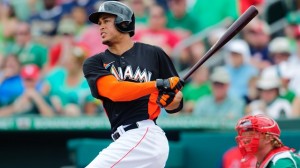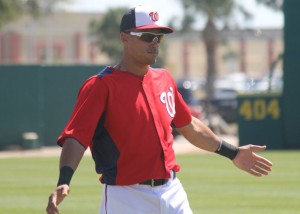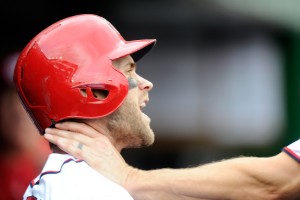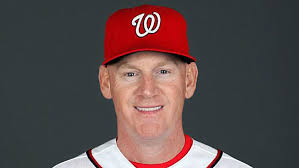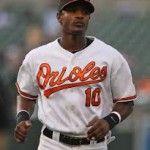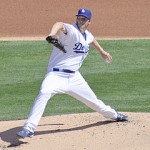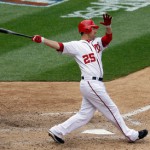
Could the team deal LaRoche to improve at 1st? Photo Rob Carr/Getty Images via bleacherreport.com
Phew. I was running out of things to talk about lately. Well, other than the ridiculous John Feinstein article this week or perhaps a missive on what a bunch of a-holes the Atlanta Braves seem to be. The federal end of year cycle has consumed all my time recently, so I’ve been late to post end-of-season minor league pitcher reviews. We’ll get there; its a long winter.
But thankfully a gift arrived via an unexpected Bill Ladson inbox dated 9/26/13. Lets see what questions Ladson took this time around. As always, I write my response here before reading his and edit questions for clarity.
Q: How disappointed were you in the 2013 Nationals?
A: Not so much disappointing as frustrating; when you’ve claimed “World Series or Bust” and your team isn’t gelling correctly, why not try to do more to fix the problem mid-season? What was the sum total of the changes this team tried to make after it was clear the team was consistently playing .500 ball? Replace a hitting coach? Demote a couple guys who deserved demoting? Trade for a 25th guy/bench player? I dunno. Why massively increase payroll and sign luxury players like $15M closers and then do nothing when the team is clearly mired in a malaise for 4/5ths of the season? Ladson says he was disappointed too.
Q: What do you consider the team’s greatest need in the offseason?
A: A better question may be this: where *can* you upgrade this team as it sits now? There’s not a single starting fielder who is a FA or who really needs to be replaced. The two worst performing hitters (Span and LaRoche) are both under contract for 2014. I’ve already seen quotes that say that Rendon will have “competition” for 2nd base next spring; from who exactly? Lombardozzi and his 68 OPS+ or Espinosa and his 27 OPS+? Right. How about the starters? The 3 main guys are not going anywhere. Getting rid of Detwiler would be selling very low. It seems clear from the FA market and from the Haren experience that the team should have a #5 starter competition between Roark, Jordan and Karns. How about the bullpen? Not really; maybe you tweak it and find a 5th or 6th guy who may pitch better than Mattheus did this year, but by and large the bulk of it already seems set (Soriano, Clippard, Stammen all seem like locks, Storen will be given a chance to rebound, one from Ohlendorf/Roark probably fits in nicely as a long-man, and your lefties Abad and Krol have both been good). So you’re left with bullpen scrubs and the bench. Not exactly high-impact spots to improve.
I was talking about this with friends recently; one thing I’d do if I was GM would be to sign Shin-Soo Choo. He posted a .424 OBP with 21 homers for Cincinnati from the leadoff position this year. Career .389 OBP. You put him in LF (since his defense in center is atrocious) and install Harper in center where he belongs. Dump Span somewhere, anywhere. Instantly you get power and a significantly improved OBP at the top of your order. The knocks on Choo are that he’s older (30 this year), that he doesn’t hit lefties (true … but his OBP split versus lefties is STILL higher than Span’s season long OBP, even given the run he’s had the last 6 weeks), and that he’ll be expensive. A move like this likely never happens; Choo will command probably 4/$40M or more, and I doubt the team wants to pay him that much or block an OF spot given the guys coming up.
I wonder if we’re not going to see something bigger and unexpected happen. A big trade that opens up a spot and lets the players move around. Or a big FA signing that forces a trade of one of these entrenched players. Because otherwise its hard to see how this team dramatically improves this off-season. Ladsons says the team needs dependable loogies, bench and the back of the rotation. Safe, obvious statements.
Q: Do you think Adam LaRoche will be traded after this season?
A: I don’t see it; I think LaRoche is a team favorite. Rizzo wants plus-defenders manning the positions and that’s how he views LaRoche. But here’s a dirty secret; LaRoche wasn’t that great this year defensively at 1st. His UZR/150 was negative, he was ranked 18th among first basemen with more than 500 innings at the position this year, and only slightly better than the very sedentary Ryan Howard and equally glacial Chris Davis on the year. And we have all seen his throwing arm; accurate but weak. But if you jettison LaRoche, who’s taking him after he hit just .230 this year? And who are you replacing him with? The FA crop is weak; who on that list would you want? Mike Napoli maybe? He can rake … but he also probably earned himself a ton of dough with his performance in Boston this year. Ladson says LaRoche is going nowhere.
Q: Why don’t the Nationals sign Michael Morse? He has been injured, and they could get him for a cheap price.
A: …. and they’d play him, where exactly? He can play left field and first base, and last time I checked we’ve got those positions covered. I like Michael Morse like every one in DC else but he was *awful* this year. And he picked an awful time to do it; age 31, in a contract year, playing in the relative media obscurity of Seattle. If he had just hit a couple bombs down the stretch for Baltimore, maybe that would have helped. Now you have to wonder if he’s just looking at a minor league deal. Would the team consider him for a bench role? Probably not, he likely still considers himself a starter and may not handle the bench well. Ladson says it isn’t happening.
Q: Is Cal Ripken Jr. managing the Nats next year just a rumor or a realistic possibility?
A: Just a rumor. What experience does Ripken have managing? He’s not like other former players like Don Mattingly (who cut his chops watching the great Joe Torre for years in New York) or Ryne Sandberg (who worked his way up the minors and earned his job in Philadelphia). I’d be worried about him being completely out of his element. What proof is there that he can handle a pitching staff or manage a game? Give me a serious, experienced, no-nonsense guy to manage this team and get the guys in line after this year’s season-long drift. Give me Matt Williams. Ladson says it isn’t going to be Ripken.
Q: Do the Nats have any interest in signing Robinson Cano?
A: Not at these prices; he reportedly wants 10yrs/$305M!! And already turned down 6/$144M. Phew. I wouldn’t pay him $24M/year in his decline years. He’s no doubt a great player; is he that good? Whoever signs him (Dodgers?) is going to really, really regret any deal longer than 6 years. Well, unless it IS the Dodgers, who may make a complete mockery of the game in the next few years in terms of payroll. Fun fact: The Dodgers already are committed to $165M in payroll next year … for just ELEVEN players. They still have to handle arbitration for Clayton Kershaw (who may command $20M) and fill out the rest of the lineup. Ladson also mentions this contract demand.
Q: How about Jayson Werth as player-manager next year? It worked for the Senators, after all, with Bucky Harris and Joe Cronin.
A: Well, if we don’t Cal Ripken can manage, what makes you think Werth has any such qualifications either? Baseball has come an awfully long way from the days where teams thought a player/manager was a workable idea. Now a-days, the money involved and egos involved almost necessitate an experienced, veteran guy for nearly every team. Ladson thinks Werth would make a great manager.
Q: What do you think is the main cause of the Nats’ struggles this season, and do you think they will be better next year?
A: (see upcoming blog post that I’ll hit “publish” on when the season is over). Ladson says in order injuries, bullpen, bench, and St. Louis.
Q: At this point, how would you handicap the likely 2014 Nats managerial candidates?
A: Who knows. Is this really the pressing issue on the minds of Nats fans like Ladson makes it out to be? Somehow I don’t think its going to be anyone on the current field staff (sorry Randy Knorr). I think it will be either a big-name manager who gets the axe this off-season unexpectedly (Mike Scioscia or Joe Girardi would be decent choices) or a former player that Rizzo knows (which is why I keep coming back to Matt Williams). Ladson says Knorr is the leader but also mentions Williams and Trent Jewett.
